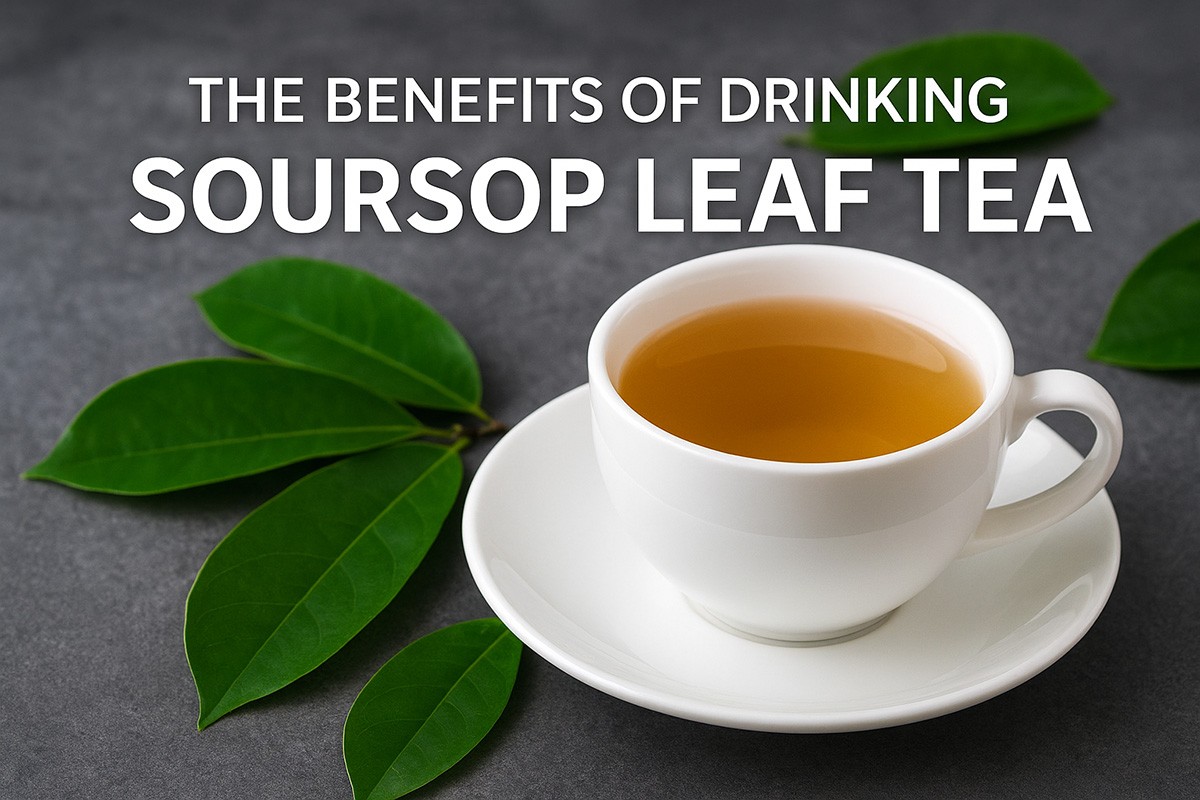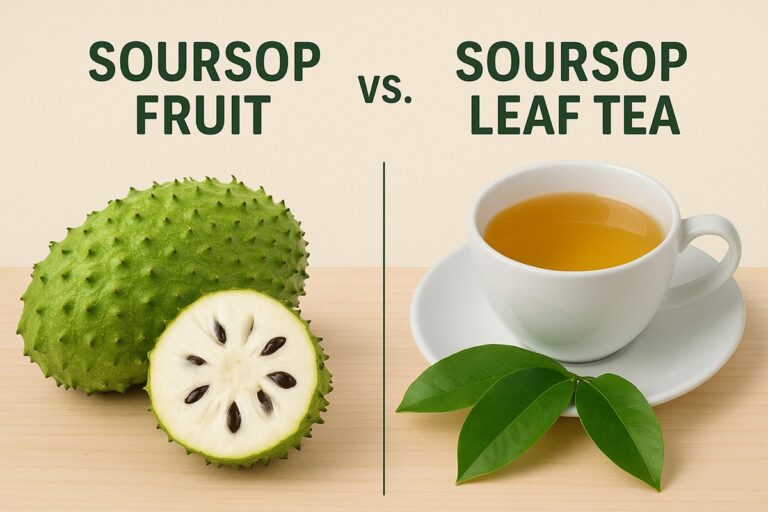(and what we do—and don’t—know so far)
What is soursop leaf tea?
Soursop (Annona muricata)—also called graviola, guanábana, or sirsak—is a tropical tree whose fruit, leaves, and other parts have long been used in traditional medicine across the Caribbean, Latin America, Africa, and Southeast Asia.
A simple infusion (tea) is made by simmering/steeping the leaves in hot water. Beyond tradition, research shows the plant contains bioactive compounds (e.g., phenolics and annonaceous acetogenins) with antioxidant and other biological activities—mostly demonstrated in lab and animal studies, not large human trials yet.
Potential benefits (what current evidence suggests)
1) Antioxidant support
Soursop leaves are rich in phenolic compounds. In vitro and extract studies report notable antioxidant capacity, which—if it translates in humans—could help neutralize free radicals that contribute to cellular stress. Human data are limited.
2) Anti-inflammatory & antimicrobial properties (preclinical)
Extracts from leaves have shown anti-inflammatory signaling effects and the ability to inhibit certain bacteria and fungi in laboratory settings. These findings are preliminary and don’t equal proven clinical effects from drinking leaf tea.
3) Metabolic and other effects (early/preclinical)
You’ll find papers exploring anti-hyperglycemic, anti-ulcer, and antihypertensive actions—again mainly in cell/animal models or small non-tea preparations. These are hypothesis-generating, not definitive guidance for daily tea use.
4) Cancer-related research (lab studies; no clinical proof for tea)
Graviola components have shown cytotoxic activity against various cancer cell lines and slowed tumor behaviors in animal models. Small safety studies of certain extracts exist, but there’s no reliable clinical evidence that soursop leaf tea treats or prevents cancer. Reputable cancer organizations caution against using it as a substitute for standard care.
What the evidence does not show
- There are no robust human trials showing that drinking soursop leaf tea cures diseases or delivers specific health outcomes. Most research uses concentrated extracts, not household tea. Regulatory bodies have warned companies that market graviola products with disease claims.
Safety, side effects, and interactions (read this before you sip)
Neurotoxicity concerns with heavy or prolonged intake
Epidemiological and mechanistic research links high, long-term consumption of soursop products (fruit, leaf infusions, and seed derivatives) containing annonacin to atypical parkinsonism in Guadeloupe—likely via mitochondrial complex I inhibition. While occasional tea is not the same as chronic high exposure, these findings urge caution and moderation.
Possible liver effects (preclinical)
Animal toxicology work has noted mild liver changes at certain doses of leaf extracts. Human data are insufficient to define a safe chronic intake for tea. If you have liver disease, talk to your clinician first.
Drug interactions (the “CYP3A4 problem”)
Many chemo and other prescription drugs are metabolized by CYP3A4. Some herbal constituents can inhibit/induce these enzymes and transporters, altering drug levels. Direct clinical interaction data for soursop tea are sparse, but the mechanism warrants caution—especially in oncology or polypharmacy.
Special populations
Because human safety data are limited, avoid in pregnancy, breastfeeding, infants/young children, and in neurological disorders unless your healthcare professional says otherwise. Traditional sources also advise against giving leaf tea to small children.
Bottom line on safety: If you choose to drink soursop leaf tea, do it occasionally, don’t treat it like a medicine, and consult your healthcare provider if you have a condition or take prescription drugs.
How people prepare soursop leaf tea (culinary guidance)
There’s no medically established “dose.” Traditional and culinary recipes typically:
- Rinse 2–10 leaves (fresh or dried).
- Simmer in ~2 cups of water for 3–10 minutes; turn off heat and steep ~10 minutes.
- Strain; optionally add lemon or honey.
Avoid seeds (they’re not used and may be more toxic). Start mild, see how you feel, and do not consume in large amounts or for long periods.
Smart ways to include it (if you choose to)
- Treat it like an occasional herbal beverage, not a therapy.
- Rotate with other non-caffeinated teas (e.g., ginger, lemongrass) to reduce cumulative exposure.
- Keep a simple diary if you’re monitoring how you feel, and stop if you notice side effects (e.g., tremor, dizziness, neuropathy).
Frequently asked questions
Is soursop leaf tea good for cancer?
There’s no clinical evidence that drinking the tea treats cancer. Laboratory studies are interesting but not proof in humans. Major cancer organizations advise against replacing standard treatment with graviola products.
Can I drink it during chemotherapy?
Not without your oncology team’s approval. Potential interactions via CYP3A4 and transporters could alter drug levels.
How often is “moderation”?
There’s no official guideline. A prudent approach is occasional use (e.g., now and then), with breaks, and avoid long-term daily consumption.
Is it safe for everyone?
No. Avoid in pregnancy/breastfeeding/early childhood and be cautious with neurological or liver conditions. Consult your clinician first.
The takeaway
Soursop leaf tea has a rich traditional history and promising preclinical signals—especially for antioxidant and antimicrobial activities. But human evidence is limited, and there are legitimate safety considerations (notably neurotoxicity with heavy, prolonged intake and potential drug interactions). If you enjoy it, do so occasionally and never as a substitute for medical care.



